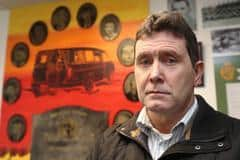Kingsmills Massacre Inquest: No evidence of state collusion in IRA atrocity, says brother of victim
and live on Freeview channel 276
Colin Worton, whose brother Kenneth was killed, was speaking after claims that the inquest procedures point to the alleged existence of informants.
The legacy inquest into the IRA murder of ten Protestant factory workers at Kingsmills in south Armagh in 1976 concluded on Friday. Coroner Brian Sherrard said it had been "an overtly sectarian attack by the IRA".
Advertisement
Hide AdAdvertisement
Hide AdIn the aftermath, the law firm acting for the family of victim John McConnville and sole survivor Alan Black raised the prospect of UK state collusion.


"The revelations in Kingsmills inquest disturbed an apparently settled narrative that collusion was entirely State-Loyalist centric," KRW Law said. "It was not. The evolving narrative on Republican–State collusion places additional pressure on the British Government and its agencies over their role in intelligence oversight."
The News Letter put it to KRW Law that this paper was not aware of any information from ten years of the inquest to imply state collusion in the atrocity.
KRW Law replied that their main concern did not relate to information that had been disclosed. It said there had been eight private hearings due to Public Interest Immunity (PII) certificates - which often mean that informants are being protected in the public interest or for national security reasons.
Advertisement
Hide AdAdvertisement
Hide Ad"The history of litigation on Troubles related cases here has shown that when PII is applied for it invariably points to the alleged existence of informants," KRW Law replied.
Asked if the existence of informants would prove the UK colluded in the attack, KRW Law said it could not address the question due to pending legal proceedings.
However Colin Worton, whose brother Kenneth was killed at Kingsmills, said he never saw any information from the inquest that suggested the authorities had advance knowledge of the attack.
"No, I didn't and I think I would have remembered something like if that had happened," he said.
Advertisement
Hide AdAdvertisement
Hide AdHowever he too was also supportive of calls for a public inquiry made by sole survivor Alan Black, mainly due to PII concerns.
The family of Kingsmills victim John McConnville, and Mr Black issued a statement after the inquest saying the McConvilles believed the attack was "let to happen"’.
They noted that a palm print on the getaway van was shockingly only matched to a suspect during the inquest itself. The inquest heard this was due to lack of Garda-RUC coordination and PSNI human error. However lack of records meant no prosecution was possible.
They also found it difficult to accept that the suspected ringleader had an On-The-Run Letter. But the coroner said that no prosecutions of suspects were possible simply because there was never any hard evidence.
Advertisement
Hide AdAdvertisement
Hide AdTheir statement also noted that Mr Black witnessed the 12 IRA men walk away calmly without any apparent concern about being arrested.
However the coroner said the size of the IRA gang "strongly suggested" they were prepared to engage with any security force patrols.
The coroner acknowledged suggestions the killers were not prosecuted to protect an informant. However he said this was “entirely without foundation in fact” as well as “unevidenced and unhelpful conspiracy theorising”.